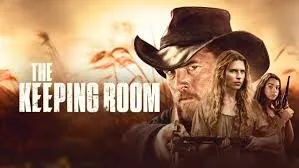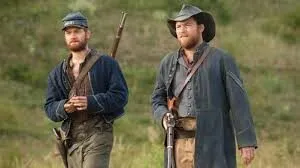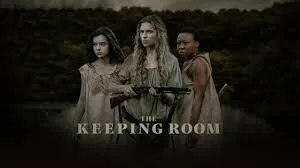The Keeping Room (2014)
June 27, 2025
Movie Review: The Keeping Room (2014)
★ ★ ★ ★ ☆
Violent, poetic, and quietly devastating, The Keeping Room is a Civil War–era thriller that trades battlefield glory for raw survival—and emerges as one of the most haunting slow-burn dramas of its year.

Set in the dying days of the American Civil War, the film follows three women—Augusta (Jessica Chastain), her younger sister Louise (Kaitlyn Dever), and their enslaved companion Mad (Gugu Mbatha-Raw)—left behind on a crumbling Southern homestead. With the men gone and society collapsing, the trio finds themselves defending their home from two rogue Union soldiers who’ve abandoned the battlefield in favor of violence and looting.

What unfolds is part siege thriller, part psychological portrait, and part feminist revenge story. But what makes The Keeping Room stand out isn’t just its premise—it’s its silence. Director Daniel Barber (Harry Brown) allows the film to breathe, using long, meditative shots of cracked fields, candlelit interiors, and shadow-drenched corners to build a sense of dread that never quite releases.

Jessica Chastain is mesmerizing as Augusta—stoic, fierce, and increasingly unhinged as the situation escalates. Gugu Mbatha-Raw delivers a quietly shattering performance as Mad, the moral center of the story, forced to fight not just for survival, but for her humanity in a world that’s denied it. Kaitlyn Dever brings youthful fear and growing steel to a character caught between childhood and war.

The violence, when it comes, is brutal but never gratuitous. Every gunshot echoes. Every wound matters. There’s a sequence involving a burning barn and a single bullet that’s as tense as anything in modern thrillers.
If there’s a flaw, it’s the film’s pacing—deliberate to the point of near-stillness at times. Those expecting a traditional Western showdown may find the structure too meditative. But for those patient enough to stay in the room, the payoff is rich and powerful.

Verdict: The Keeping Room is a harrowing portrait of war on the margins—stripped of glory, filled with fear, and driven by the quiet, terrible strength of women who refuse to vanish.

